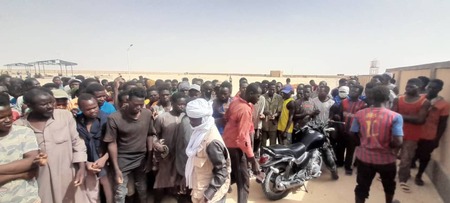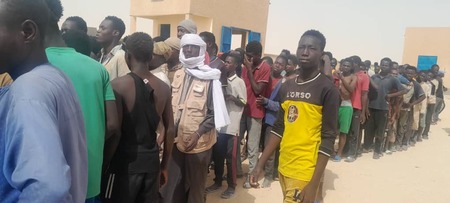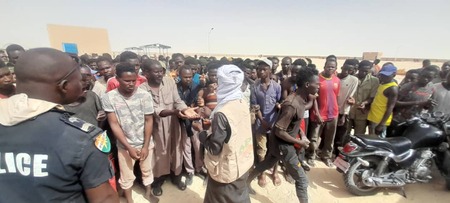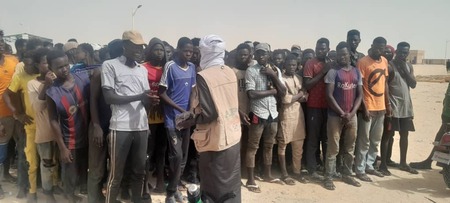10,000 people arrested in Libya for deportation, according to local sources
Alarme Phone Sahara whistleblowers report the arrival of 463 deportees, all adult males and citizens of Niger, in Dirkou, in the Kaouar desert area of northern Niger. According to local sources in Libya, this deportation is just the start of a wave of deportations planned from Libya to Niger. The same sources report that an estimated 10,000 people, mostly Niger nationals, have been arrested in Libya by General Khalifa Haftar's forces for deportation.


Citizens of Niger arriving in Dirkou after deportation from Libya © Alarme Phone Sahara
Khalifa Haftar: A warlord as Europe's gatekeeper?
General Khalifa Haftar is the most powerful adversary of the Libyan ‘Government of National Accord’ in Tripolis, officially recognised by most states, with whom he has been at war on several occasions. Haftar's troops and his allies control large swaths of Libyan territory, particularly in the east and south of the country.
According to local sources, the funds paid out by EU countries to repel migrants and refugees in Libya are not only intended for the ‘Government of National Accord’ in Tripoli, but also for Haftar's forces. This in turn would strengthen the interest of the latter in distinguishing themselves by arresting and deporting people from sub-Saharan countries. There is an urgent need to verify whether and to what extent funds have actually been paid by EU member states to General Haftar's forces, what exactly they are being used for and from what sources.
In any case, the arrest and mass deportation of 10,000 people represents a new quality compared to the situation in recent years. Many people from Niger have travelled between Niger and Libya in recent years and have worked in Libya in various occupations, often as seasonal migrants.
According to the analysis by the members of the Alarme Phone Sahara team in the Kaouar area, the fact that they are now increasingly the target of violent deportations is also a reaction to the repeal of the anti-migration law ‘2015-036’ in Niger and therefore an attempt to put an end to this gain in freedom of movement in the interests of European donors. In addition, the members of the Alarme Phone Sahara team believe that the recent deportation operations are also a reaction on the part of the Libyan forces to the arrival of large numbers of migrants from Niger and other sub-Saharan countries in search of work. According to them, migrants are faced with a lack of infrastructure in Libyan cities, which the forces in power there are now trying to resolve repressively, by deporting people on a large scale.
The situation of Nigeriens deported from Libya
According to reports from Alarme Phone Sahara‘s whistleblowers in Dirkou and other localities in the Kaouar area, the people being deported are in an extremely precarious situation. At this point, it is seriously beyond the capacity of local structures to provide these people with food and other basic necessities. Initiatives such as the Alarme Phone Sahara team certainly organise the distribution of food kits to the best of their ability, even with the support of local police forces. But when hundreds of people are involved, and their numbers are growing, they quickly reach their limits.


Member of the local Alarme Phone Sahara team distributing food kits to people deported from Libya, with a local police officer assisting the distribution © Alarme Phone Sahara
The deportees are also forced to sleep on the streets, as there are no camps or other accomodation structures for them. According to the latest reports, the IOM has begun to organise transport for deportees to leave Dirkou and go to Agadez.
Even so, the danger remains that if the forces in charge in Libya stick to their plan to deport 10,000 people to Niger in a short space of time, Dirkou and the other towns in the Kaouar area risk a humanitarian crisis with, in the worst case scenario, fatal consequences for those deported.
All these developments are reminiscent of the situation in Assamaka since the spring of 2023, when a humanitarian crisis also erupted in this desert village of just 1,500 inhabitants, where thousands of migrants deported from Algeria arrived without adequate food, accommodation or medical care. If the situation in Dirkou were to worsen and 10,000 deportees actually arrived, a second hotspot would be formed in the north of Niger. A second hotspot in the middle of the desert, on the outsourced borders of the European Union.
Faced with the threat of a humanitarian crisis due to mass deportations from Libya to Niger, Alarme Phone Sahara is calling for :
- Rapidly make available the necessary resources to ensure the supply of food and other basic necessities for those deported to Dirkou and other localities in the Kaouar region.
- Immediate reopening of sufficient reception, accommodation, care and transport facilities for all migrants and refugees who need them!
- Immediate and urgent release of sufficient resources for local organisations or other humanitarian aid providers that are ready and able to take concrete initiatives.
- Beyond humanitarian aid, we need a political solution. This means putting an immediate stop to the mass deportations that have begun from Libya to Niger.
- The EU countries, for their part, must put an end to the dirty deals struck with both General Haftar's forces and the Libyan ‘Government of National Accord’ to fight against migration.

